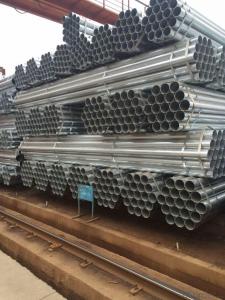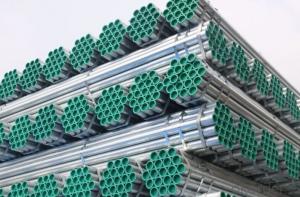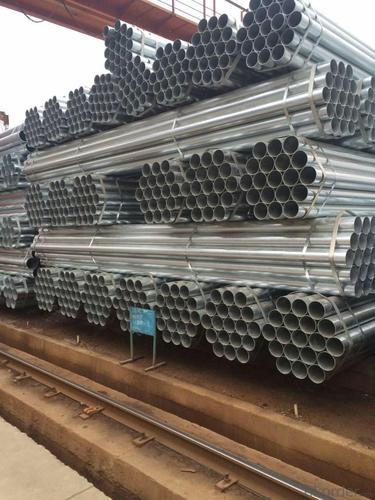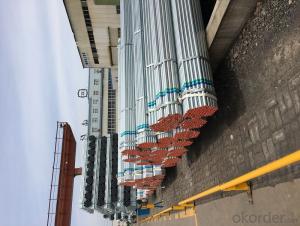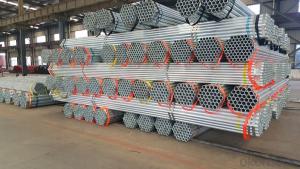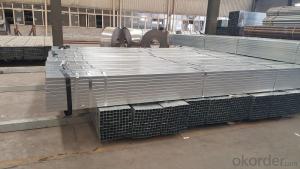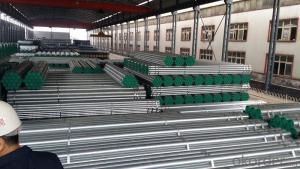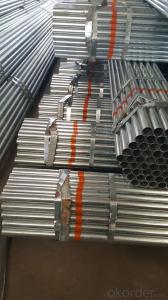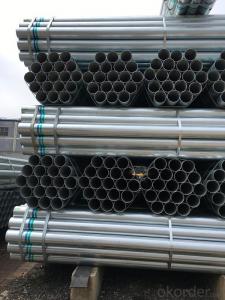Hot dip galvanized welded steel pipe for construction machinery
- Loading Port:
- Tianjin
- Payment Terms:
- TT OR LC
- Min Order Qty:
- 35 m.t.
- Supply Capability:
- 15000 m.t./month
OKorder Service Pledge
OKorder Financial Service
You Might Also Like
Specification
1、 Hot dip galvanized welded steel pipe for construction machinery
:
The surface of galvanized steel pipe welded steel pipe of hot dip galvanized layer or. Galvanized can increase the corrosion resistance of the steel tube, prolong service life. Galvanized pipe is widely used, in addition to water, gas, oil and other general low pressure fluid pipelines. It is also used in the petroleum industry, especially for offshore oil field of oil well pipe and oil pipe, chemical, coking equipment of oil heater, condensation cooler, coal run oil exchanger tube, and trestle pile, the mine tunnel support frame tube.
2、Main Features of Hot dip galvanized welded steel pipe for construction machinery
:• High manufacturing accuracy
• High strength
• Good visual effect
• Reasonable price
3、 Hot dip galvanized welded steel pipe for construction machinery Specification:
Standard | GB, DIN, ASTM ASTM A106-2006, ASTM A53-2007 |
Grade | 10#-45#, 16Mn 10#, 20#, 45#, 16Mn |
Thickness | 1 - 33 mm |
Section Shape | Round |
Outer Diameter | 21 - 610mm |
Place of Origin | Tianjin, China (Mainland) |
Secondary Or Not | Non-secondary |
Application | Hydraulic Pipe |
Technique | Cold Drawn |
Certification | API |
Surface Treatment | factory state or painted black |
Special Pipe | API Pipe |
Alloy Or Not | Non-alloy |
Length | 5-12M |
Outer Diameter | 21.3-610mm |
Grade | 20#, 45#, Q345, API J55, API K55, API L80, API N80, API P110, A53B |
Standard | ASME, ASTM |
1) Material:Q195 Q235 Q345 X42 X52
2) Specification range:OD:21.3-610mm,WT:6-70mm,length:6-12m or according to the requirement of clients.
3) Excutive standards:GB,ASME API5L.ASTM A 106/A53,Despite of the above standards,we can also supply seamless steel pipe with standard of DIN,JIS,and so on,and also develop new products according to the requirements of our clients!
4) Surface: galvanized.
5) Ends:Beveled or square cut,plastic capped,painted.
6) Packing:bundles wrapped with strong steel strip,seaworthy packing.
4、Packaging & Delivery
Packaging Details: | seaworthy package,bundles wrapped with strong steel strip |
Delivery Detail: | 15-30days after received 30%TT |
5、FAQ of Hot dip galvanized welded steel pipe for construction machinery
...①How is the quality of your products?
Our products are manufactured strictly according to national and internaional standard, and we take a test
on every pipe before delivered out. If you want see our quality certifications and all kinds of testing report, please just ask us for it.
Guaranteed: If products’ quality don’t accord to discription as we give or the promise before you place order, we promise 100% refund.
②How about price?
Yes, we are factory and be able to give you lowest price below market one, and we have a policy that “ for saving time and absolutely honest business attitude, we quote as lowest as possible for any customer, and discount can be given according to quantity”,if you like bargain and factory price is not low enough as you think, just don’t waste your time.Please trust the quotation we would give you, it is professional one.
③Why should you chose us?
Chose happens because of quality, then price, We can give you both.Additionally, we can also offer professional products inquiry, products knowledge train(for agents), smooth goods delivery, exellent customer solution proposals.Our service formula: good quality+good price+good service=customer’s trust
SGS test is available, customer inspection before shipping is welcome, third party inspection is no problem.
6、 Hot dip galvanized welded steel pipe for water gas Images:
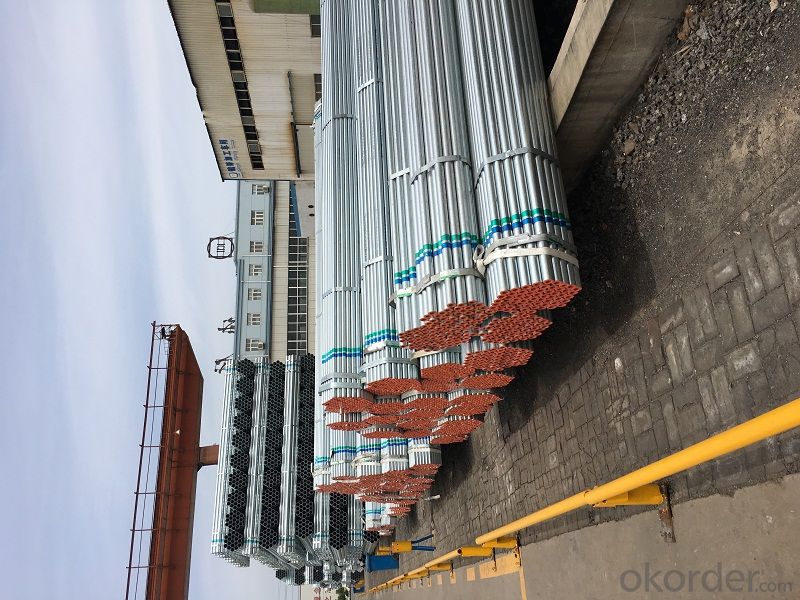
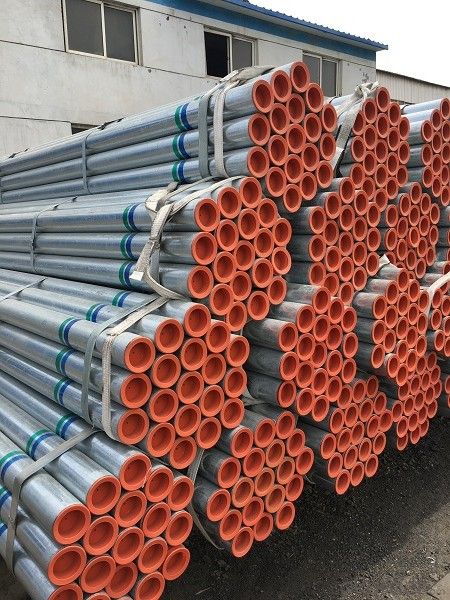
- Q: How do you calculate the pipe volume flow rate for steel pipes?
- To calculate the volume flow rate of steel pipes, you need to consider the pipe's diameter and fluid velocity. The formula used for this calculation is Q = A * V, where Q represents the volume flow rate, A is the cross-sectional area of the pipe, and V is the fluid velocity. To start, you need to determine the cross-sectional area of the pipe. For a circular pipe, you can use the formula A = π * r², where A is the area and r is the radius of the pipe. If the diameter of the pipe is given, you can simply divide it by 2 to obtain the radius. Next, you need to determine the fluid velocity. This can be done by measuring the velocity directly using a flowmeter or by calculating it based on the fluid's properties and the pressure drop across the pipe using the Bernoulli equation or other appropriate equations. Once you have both the cross-sectional area and fluid velocity, you can multiply them together to find the volume flow rate. Make sure the units are consistent throughout the calculation. For example, if the area is in square meters and the velocity is in meters per second, the resulting volume flow rate will be in cubic meters per second. It is worth noting that the calculation assumes the fluid is incompressible and flows steadily through the pipe. If the fluid properties or flow conditions change, additional considerations may be required to accurately calculate the volume flow rate.
- Q: How are steel pipes resistant to corrosion?
- Steel pipes are resistant to corrosion due to a combination of factors. Firstly, steel pipes are often coated with a protective layer, such as zinc or epoxy, which acts as a barrier between the steel and the surrounding environment. This coating prevents moisture and other corrosive substances from coming into contact with the steel, reducing the chances of corrosion. Additionally, the composition of steel itself plays a role in its corrosion resistance. Steel is primarily made up of iron, with small amounts of other elements added to enhance its strength and durability. These elements, such as chromium and nickel, create a protective oxide layer on the surface of the steel. This oxide layer acts as a natural barrier, preventing the underlying steel from being exposed to moisture and oxygen, which are key contributors to corrosion. Furthermore, steel pipes can be treated through a process called galvanization, where a layer of zinc is applied to the surface. This zinc coating provides an extra layer of protection against corrosion, as zinc is highly resistant to rust and oxidation. The zinc sacrificially corrodes instead of the steel, further extending the lifespan of the pipe. Overall, the combination of protective coatings, the composition of steel, and galvanization processes all contribute to the corrosion resistance of steel pipes. This makes them highly durable and suitable for various applications, including plumbing, construction, and transportation of fluids and gases.
- Q: Can steel pipes be used for transporting gases?
- Yes, steel pipes can be used for transporting gases. Steel pipes are known for their strength, durability, and resistance to corrosion, making them an ideal choice for transporting various gases over long distances. Additionally, steel pipes can handle high pressure and extreme temperatures, ensuring the safe and efficient transportation of gases.
- Q: What is the difference between internal lining and external coating of steel pipes?
- The internal lining of steel pipes refers to a protective layer or coating applied inside the pipe to prevent corrosion and to enhance the flow of fluids. This lining is typically made of materials like epoxy, cement mortar, or polyethylene, and it helps to reduce friction and resist the effects of chemicals or contaminants that may be present in the fluid being transported. On the other hand, the external coating of steel pipes is a layer or coating applied to the outside of the pipe to protect it from external factors like weather, soil, or mechanical damage. This coating is usually made of materials such as fusion-bonded epoxy, polyethylene, or polypropylene, and it acts as a barrier against corrosion, moisture, or abrasion. In summary, the internal lining of steel pipes focuses on protecting the pipe from the inside, while the external coating is intended to safeguard the pipe from external elements. Both the internal lining and external coating are essential for maintaining the integrity and longevity of steel pipes.
- Q: What is the difference between galvanized iron pipe and galvanized steel pipe? Or called different, in fact, is referred to as galvanized pipe?
- Different materials, cast iron, steel seamless steel pipe; the different production process, cast iron is hot metal casting, steel rolling mill of seamless steel tube is through processing, different performance indexes, ductile iron diameter, wall thickness, crisp texture, relatively heavy, can be made of seamless steel pipe diameter is very small, the wall is very thin, good toughness, light. Cast iron, cheap, but the bottom of the strength, can only be used in low pressure occasions.
- Q: How are steel pipes used in the construction of tunnels?
- Steel pipes are used in the construction of tunnels for various purposes such as drainage, ventilation, and transportation of utilities. They provide structural support, ensuring stability and strength, while also allowing for the efficient flow of water, air, and other essential resources within the tunnel.
- Q: What does carbon seamless steel pipe mean? What is the difference between a seamless 20# and an ordinary one? What is it used in detail?
- Carbon steel is relatively alloy steel. Its carbon content is higher than alloy steel, and 20# steel is one kind of carbon steel.
- Q: What is the difference between steel pipe and aluminum pipe?
- Steel pipes and aluminum pipes differ primarily in their composition and physical properties. Steel pipes are composed of iron and carbon, with added elements for strength and corrosion resistance. In contrast, aluminum pipes are made entirely of lightweight and highly corrosion-resistant aluminum. The weight of the pipes is a significant distinction. Steel is denser than aluminum, making steel pipes heavier and more robust. This characteristic makes steel pipes ideal for applications requiring structural strength and load-bearing capabilities. On the other hand, aluminum pipes offer advantages due to their lightweight nature. They weigh only about one-third of steel pipes, making them easier to handle, transport, and install. This lightweight property is especially beneficial in industries such as aerospace and automotive, where weight reduction is crucial. Corrosion resistance is another important consideration. Steel pipes are prone to rust and corrosion, especially in moist or corrosive environments. To address this issue, steel pipes are often coated or galvanized. In contrast, aluminum pipes naturally resist corrosion due to the formation of a protective layer of aluminum oxide on their surface. Cost is also a factor to consider. Generally, steel pipes are more cost-effective due to lower raw material and manufacturing costs. However, long-term maintenance costs and lifespan may vary between steel and aluminum pipes, so specific requirements and durability should be taken into account. In conclusion, the difference between steel and aluminum pipes lies in their weight, strength, corrosion resistance, and cost. Steel pipes are heavier, stronger, and more prone to rust and corrosion but are generally more cost-effective. Aluminum pipes are lightweight, corrosion-resistant, and costlier but offer advantages in weight reduction and specific applications requiring corrosion resistance. The choice between steel and aluminum pipes depends on the project's needs and desired properties for optimal performance.
- Q: What is the typical lifespan of steel pipes?
- The typical lifespan of steel pipes can vary depending on various factors such as the quality of the steel used, the environmental conditions, and the maintenance and usage of the pipes. However, on average, steel pipes are known to have a lifespan of around 50 to 100 years. With proper installation, regular inspections, and appropriate maintenance, steel pipes can often exceed this lifespan and provide reliable service for several decades. It is important to note that factors such as corrosion, erosion, and external damage can impact the lifespan of steel pipes, so it is crucial to implement preventive measures and necessary repairs to ensure their longevity.
Send your message to us
Hot dip galvanized welded steel pipe for construction machinery
- Loading Port:
- Tianjin
- Payment Terms:
- TT OR LC
- Min Order Qty:
- 35 m.t.
- Supply Capability:
- 15000 m.t./month
OKorder Service Pledge
OKorder Financial Service
Similar products
Hot products
Hot Searches
Related keywords
